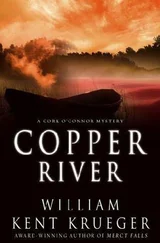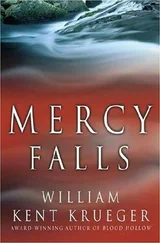William Krueger - Ordinary Grace
Здесь есть возможность читать онлайн «William Krueger - Ordinary Grace» весь текст электронной книги совершенно бесплатно (целиком полную версию без сокращений). В некоторых случаях можно слушать аудио, скачать через торрент в формате fb2 и присутствует краткое содержание. Жанр: Триллер, на английском языке. Описание произведения, (предисловие) а так же отзывы посетителей доступны на портале библиотеки ЛибКат.
- Название:Ordinary Grace
- Автор:
- Жанр:
- Год:неизвестен
- ISBN:нет данных
- Рейтинг книги:4 / 5. Голосов: 1
-
Избранное:Добавить в избранное
- Отзывы:
-
Ваша оценка:
- 80
- 1
- 2
- 3
- 4
- 5
Ordinary Grace: краткое содержание, описание и аннотация
Предлагаем к чтению аннотацию, описание, краткое содержание или предисловие (зависит от того, что написал сам автор книги «Ordinary Grace»). Если вы не нашли необходимую информацию о книге — напишите в комментариях, мы постараемся отыскать её.
Ordinary Grace — читать онлайн бесплатно полную книгу (весь текст) целиком
Ниже представлен текст книги, разбитый по страницам. Система сохранения места последней прочитанной страницы, позволяет с удобством читать онлайн бесплатно книгу «Ordinary Grace», без необходимости каждый раз заново искать на чём Вы остановились. Поставьте закладку, и сможете в любой момент перейти на страницу, на которой закончили чтение.
Интервал:
Закладка:
“Lise is fortunate to have Jake as a friend,” Brandt said. “N takes B-five.”
“Jake seems pretty happy with the arrangement. C takes B-five.”
“Lise has no other friends. Really she has no one but me. And I rely on her for so much. I wonder sometimes what will happen to her when I’m gone. B takes B-five. Check.”
“That’s years away, Emil. And she has family besides you.”
“They ignore her. They’ve ignored her all her life. Sometimes I think that when I came home blind they were ecstatic. It created a situation that bound their two misfits together in a controllable fashion. Here we reside inside this fence, which, for all intents and purposes, is the extent of our world. And you want to know the odd part of it, Nathan? We’re happy. I have my music and Lise. Lise has her garden and me.”
“I thought you said happiness was fleeting.”
Brandt laughed and said, “Trapped with my own words. But if you look at the board carefully, Nathan, I think you’ll see that I have laid a trap for you there.”
My father spent a few moments studying the game and then said, “Ah, I see what you mean. Clever, Emil. I resign.”
They continued to talk and I watched Jake and Lise in the garden and listened to Ariel clicking away on the typewriter in the study, and the world inside that picket fence seemed like a good place, a place in which all the damaged pieces somehow fit.
In the early afternoon my father got himself ready for the burial of the man we’d all begun calling simply the itinerant and I told him I wanted to go along. He asked my reason and I tried to articulate my thinking although the truth was that I didn’t really know. It simply felt right. I had been the one to bring the body to light and it seemed fitting that I be there when it was delivered into a darkness eternal. I tried to say as much but knew even as I spoke that I was saying it all wrong. In the end my father studied me a long time and finally allowed as he saw no reason for me not to be there. His only requirement was that I dress as I would for the funeral of someone we knew which meant my Sunday best.
Jake was odd about the dead man. He wanted nothing to do with the burial and went so far as to accuse me of using the whole episode to my advantage. “You just like being a big man,” he said looking up at me from the card table he’d set up in the living room where he was at work on a paint-by-number. The picture on the box cover showed a rocky beach in an idyllic place that was maybe Maine and looked inviting but it was clear that Jake’s rendering, despite the guidance of lines and numbers, would end up a good deal less than he or anyone but a moron or a monkey would have hoped for.
“Fine,” I said and I dressed alone.
My father drove the Packard to the cemetery which was set on a hill on the east side of town. The hole was already dug and Gus was waiting and Sheriff Gregor was there though I didn’t know why and moments after we arrived Mr. van der Waal drove up in the hearse and my father and Gus and the sheriff and the mortician slid the coffin from the back. It was a simple box of pine planed and sanded smooth and it had no handles. The men lifted and carried it on their shoulders to the grave. They laid it on wooden two-by-fours that Gus had arranged across the opening along with canvas straps for the eventual lowering into the earth. Then the men stood back and I with them and my father opened his Bible.
It seemed to me a good day to be dead and by that I mean that if the dead cared no more about the worries they’d shouldered in life and could lie back and enjoy the best of what God had created it was a day for exactly such. The air was warm and still and the grass of the cemetery which Gus kept watered and clipped was soft green and the river that reflected the sky was a long ribbon of blue silk and I thought that when I died this was the place exactly I would want to lie and this was the scene that forever I would want to look upon. And I thought that it was strange that a resting place so kingly had been given to a man who had nothing and about whom we knew so little that even his name was a mystery. And though I didn’t know at all and still do not the truth of the arrangement, I suspected that it was somehow my father’s doing. My father and his great embracing heart.
He read the Twenty-Third Psalm and then he read from Romans ending with: “For I am convinced that neither death, nor life, nor angels, nor principalities, nor present things, nor future things, nor powers, nor height, nor depth, nor any other creature will be able to separate us from the love of God in Christ Jesus our Lord.”
He closed the book and said, “We believe too often that on the roads we walk we walk alone. Which is never true. Even this man who is unknown to us was known to God and God was his constant companion. God never promised us an easy life. He never promised that we wouldn’t suffer, that we wouldn’t feel despair and loneliness and confusion and desperation. What he did promise was that in our suffering we would never be alone. And though we may sometimes make ourselves blind and deaf to his presence he is beside us and around us and within us always. We are never separated from his love. And he promised us something else, the most important promise of all. That there would be surcease. That there would be an end to our pain and our suffering and our loneliness, that we would be with him and know him, and this would be heaven. This man, who in life may have felt utterly alone, feels alone no more. This man, whose life may have been days and nights of endless waiting, is waiting no more. He is where God always knew he would be, in a place prepared. And for this we rejoice.”
My father led us in the Lord’s Prayer and we stood in silence for a few moments staring down at the simple coffin which was pale yellow against the black of the hole beneath. And then my father said something that amazed me. He said, “It’s a good day to be dead.” Which were almost the exact words I’d been thinking. And he said, “Let this man in this place of beauty rest forever in peace.” Which was also very nearly what I’d been thinking. And he nodded to the other men and they each took a strap end.
The mortician said, “Frank, when we lift, would you please remove the boards?”
They lifted and I bent and slid the two-by-fours from underneath and the men slowly lowered the coffin. When it was settled they drew the straps back up and my father said, “Gus, would you like a hand?”
“No, Captain,” Gus said. “I’ve got all day and I intend to take my time.”
My father shook hands with the sheriff and with the mortician and we returned to our vehicles and left Gus to the duty of sealing the grave with the dirt he’d removed to create it.
At home my father said, “I’m going back into town. I have some details to take care of with Sheriff Gregor and with Mr. van der Waal.” He left again in the Packard. Jake was nowhere to be seen. From the church across the street came the sound of Ariel playing the organ and my mother singing. I changed my clothes and went to the church and asked about Jake.
“Apparently Danny O’Keefe’s great-uncle wandered off,” my mother said. “Jake went to help Danny find him. Where’s your father?”
I was surprised to hear that Danny had a great-uncle in New Bremen. He’d told me most of his relatives lived near Granite Falls. I said, “He had to go back into town.” Then I said, “You let Jake go out of the yard? He was grounded, same as me.”
She was studying the music sheets in her hands and not really paying attention to me. They were working on a piece, a chorale that Ariel had composed for the Fourth of July celebration which would take place in another week. “His friend needed help,” Mother said. “I told him it was all right.”
Читать дальшеИнтервал:
Закладка:
Похожие книги на «Ordinary Grace»
Представляем Вашему вниманию похожие книги на «Ordinary Grace» списком для выбора. Мы отобрали схожую по названию и смыслу литературу в надежде предоставить читателям больше вариантов отыскать новые, интересные, ещё непрочитанные произведения.
Обсуждение, отзывы о книге «Ordinary Grace» и просто собственные мнения читателей. Оставьте ваши комментарии, напишите, что Вы думаете о произведении, его смысле или главных героях. Укажите что конкретно понравилось, а что нет, и почему Вы так считаете.












